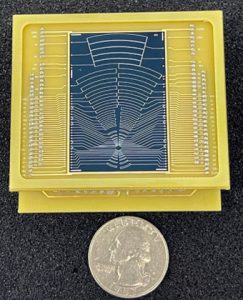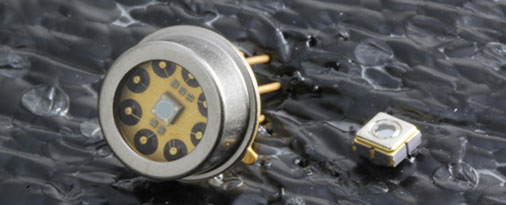Marktech Optoelectronics
3 Northway Lane North
Latham, NY 12110
Fax: +1-785-4725
Email: [email protected]
The broadest line of both silicon and InGaAs detectors commercially available.
Indium Gallium Arsenide (InGaAs) PIN photodiodes are made using InGaAs/InP technology.
Cutting-edge silicon photodetectors that excel in precise detection of light ranging in wavelength from 250nm to 1100nm
Monolithic “quads” or quadrant photodiodes (QPDs) are 2 X 2 photodiode arrays with four planar diffused photodiode elements or segments.
Marktech offers a broad line of silicon photo Transistors in a variety of package types ranging from miniature metal can to ceramic packages.
Our High-Reliability Photoreflectors are sensors that contain both the LED emitter and photodetector functions within a single package.
Marktech Si APD’s offer low-level light and short pulse detections of wavelengths between 400 nm and 1100 nm.
UV detectors are offered in a variety of TO metal-can type packages from TO-18 to TO-39 with special UV glass lens to insure optimum lifetime and the least amount of material degradation
With the ability to detect light in the UV, visible, and infrared spectrums, photo detectors, photo transistors, and photodiodes are being used in increasingly more applications.
Marktech offers the broadest range of emitters commercially available ranging from 235nm to 4300nm across the UV, visible, NIR, SWIR, and MWIR spectral ranges.
Marktech offers the broadest range of UV LEDs commercially available ranging from 235nm to 400nm including UVA, UVB, UVC, and deep UVC LEDs.
Our advanced line of visible LED products is engineered to deliver high-quality, energy-efficient lighting solutions across various applications from 400nm to 700nm..
Our NIR LED wavelength range is typically from 700nm to 1000nm, extending into wavelengths invisible to the human eye but crucial for numerous technological and scientific applications.
Our standard product offering includes wavelengths from 1020nm to 4300nm and operating currents ranging from 20mA to 350mA for high-power applications.
Our Point Source LEDs are specifically engineered for optical encoders, edge sensors, and other critical applications that demand highly focused light with minimal dispersion.
Multi-LED chips in a single package, our multiple wavelength LEDs are engineered to address a myriad of applications across the UV, visible, NIR, SWIR, and MWIR spectral ranges
Designed to produce a highly defined red dot or reticle, facilitating accurate aiming without revealing the location to the target.
Ideally suited for applications including edge sensing, line sensing, coin bill validation, and bar code reading
Our panels are crafted to deliver uniform, vibrant illumination across a wide range of applications, from consumer electronics to industrial displays.
Crafted with the latest LED technology, these rings provide adjustable illumination to meet specific needs, ensuring optimal visibility and enhancing the quality of your projects.
As a proud CREE LED Solution Provider for over a decade, Marktech offers comprehensive engineering support, including design, binning, and material selection, alongside custom packaging options for specialized applications.
CREE LED through-hole emitters, designed for high-temperature and moisture environments with UV-resistant optical-grade epoxy, offer a range of colors for versatile applications in signage and lighting.
CREE High Brightness (HB) SMD LEDs are the brightest, most reliable architectural, video, signage, scoreboard, roadway, and specialty LEDs available today.
CREE LED’s P4 series represents a leap in LED design, combining efficiency with aesthetic versatility to meet the demands of modern lighting applications.
Marktech’s CREE LED XLamp® offerings on aluminum core starboards simplify LED integration for designers, providing a range of colors and angles on compact boards for easy testing and implementation in varied lighting applications.
Marktech Optoelectronics introduces its new product line of CREE LED die, including the EZ1350 Series Die, packaged in TO-cans (TO-18 and TO-39 outlines) designed for precision and reliability in demanding applications with protection against environmental factors like moisture and dust.
CREE LED’s Versatile InGaN-based LED chips are designed to meet diverse needs for blue, green, and white-converted LEDs.
Marktech Optoelectronics combines over 40 years of expertise in optoelectronics with a focus on customized engineering solutions, addressing specific customer needs and applications.
Custom photodiode detectors are designed to meet unique customer requirements, offering specialized performance features and cost savings through optimizations such as integrated filters, photodiode arrays, and hybridization.
Through our vertically integrated manufacturing facilities in California and Japan, we offer custom LED solutions, including packaging and optoelectrical categorization, enhancing product design and market readiness.
Multiple LED dies combined in a single package are engineered to address various applications across the UV, visible, NIR, SWIR, and MWIR spectral ranges.
To succeed, you need the exact optoelectronic package custom-designed and manufactured for your application, including hermetic metal SMD, TO-can, plastic SMD, and molded through-hole packaging.
Made-to-order semiconductor chips (die) and wafers are designed and fabricated to fit your needs. Standard dies are available in specific wavelengths for high-volume production applications.
Bare and encapsulated LEDs, photodiodes, and other components are assembled on FR4, metal-cored, and flexible circuit boards, ready for production.
Learn about the latest trends, devices, and potential applications.
The latest news and announcements from Marktech Optoelectronics.
Detailed information about common uses for Marktech Optoelectronics devices.
In depth discussions on LEDs, Detectors and the science behind them.
Become familiar with common terminology and concepts for LED Devices.
List of common concepts and definitions for Photodiodes.
The supplier should have a broad enough product line to meet your current and future needs.
They should have photodiodes in their line-up meeting your application’s wavelength sensitivity, speed, dark current, and size needs. For example, Marktech produces both silicon and indium gallium arsenide (InGaAs) photodiodes, which provide a wavelength sensitivity range from 250nm to 2600nm – or, over the ultraviolet (UVB), visible, near infrared (NIR) and short wave infrared (SWIR) bands. Marktech has an extensive line-up of photodiode detectors with these wavelengths with a range of active areas and package types. However, suppose the supplier only has one or few types of photodiodes. In that case, photodetectors may not be their main focus. As a result, they will not be able to provide as many choices, assistance in selecting the suitable detector, and guidance in developing detector specifications.
Marktech has 500+ standard or catalog detectors, LED products, and over 3000 customized products. Most catalog products are available immediately through our distributors, Digi-Key Electronics and Mouser Electronics.
In 2021, Marktech products became available in Japan through our latest partner, Rikei Corporation. Established 65 years ago in Tokyo, Rikei Corporation is a trusted trading partner and value-added solutions provider serving many electronic original equipment manufacturers (OEMs) and communications companies. Rikei excels in system integration and component distribution, leveraging superior procurement skills, deep domain knowledge, and expertise in systems technology and electronics for high-quality solutions throughout the project lifecycle.
Marktech also has sales engineering representatives in Canada (ARL Group), Israel (Militram), and France & Germany (Syscom-Prorep). Our extensive offering and ability to tailor products to specific OEM design specifications have long set Marktech apart from other optoelectronic manufacturers. For example, Marktech’s photodiode detectors have various wavelength sensitivity ranges, active area sizes, and package types including TO can, SMD, PLCC, through-hole, and hermetic SMD packaging.

The supplier should be familiar with your application or ideally developed or customized photodetectors for similar use cases. Every application can have unique details necessitating intricate modifications to detector specifications to enable viable detection levels. Off-the-shelf or catalog photodiodes can be sufficient for less demanding applications. However, we have found in many cases that customization of a photodiode in terms of wavelength sensitivity, active area size, package type, and hermetic properties can increase the overall performance and reduce the total cost of your design. The custom component cost might be slightly higher, but reducing part count and simplifying circuit designs can result in a total cost benefit. In addition, Marktech can further customize photodetector designs by adding amplifiers, thermionic coolers, and LED emitter in the same package. Marktech can also apply anti-reflective coatings and filter coatings to windows or lids. Marktech has partnered with many OEMs to develop specialized InGaAs and silicon photodiode detectors for aerospace, analytical instrument, automotive, automation & industrial sensing, medical, and wearable applications. Our products can be found on satellites, top-tier automobiles, non-invasive medical diagnostic devices, position sensors, spectrometers, refractometers, laser alignment systems, and colorimeters.
Position sensing, spectrometry, refractometry, LiDAR, security, and other industrial applications often use photodetectors in conjunction with an LED emitter or light source. Therefore, the manufacturer should have LED emitters with the wavelength and power ranges to complement the photodetector selected. Marktech has an extensive line of LED emitters to provide the proper light source for InGaAs and silicon photodiode detectors selected. Marktech’s testing laboratories can evaluate both emitters and detectors. In addition, our labs can customize or sort LEDs to tighter or lower variations in peak wavelength (±1nm). Our optoelectronics engineers and LED experts can further customize LEDs with packaging and assembly options such as flex circuits, COB, and PCB.

Cutting-edge optoelectronic design require a supplier with innovative product and a willingness to customize and try new approaches, and expand the capabilities of their photodiode when required by a customer’s application. The frequent additions of new products to a photodiode manufacturer’s catalog indicates growth and innovation. Marktech is constantly adding new and innovative product to their portfolio of photodetectors and LED emitters. In addition, Marktech’s photodiode detectors are recognized and sought after for their integrity and reliability.
In 2023, Marktech’s ATLAS Hermetic SMD Packaged InGaAs Photodiodes won the Best of Sensor award in the Aerospace/Space category at the Sensors Converge conference and exhibition. The award demonstrates Marktech’s ability to develop and manufacture high performance photonics products.
Marktech’s award winning, compact hermetic SMD ATLAS packaged InGaAs photodiode (right) compared to a bulky TO can packaged detector (left).


Our InGaAs photodiode detector factory in Japan
The ability to test is essential in assuring quality, troubleshooting application problems, and simulating field conditions. In some cases, testing can show how variations in the application or use of a photodiode causes detection issues, which can be resolved through packaging, end-product design changes, or photodiode chip specification adjustments. Marktech has extensive expertise and laboratories for optoelectronic testing of both detectors and LED emitters.
Photodiodes should be manufactured in a country without supply chain issues arising from COIVD shutdowns, political upheavals, sanctions, or transportation problems. Ideally, your photodiode supplier should be located near your factory or within the same country. If the manufacturer has a catalog or standard offering of photodiodes, then these products could be delivered rapidly. In addition, while the specific photodiode might have to be customized for your application, a standard photodiode might help move the development process forward and collect data to finalize the photodiode specification.
Marktech has manufacturing facilities in Simi Valley, California and in Japan. We have extensive optoelectronic engineering and testing laboratories in Latham, New York and in Japan. Marktech has one the shortest delivery lead times in the photodetector industry for standard and custom photodiodes. Marktech’s standard photodiodes are available through Digi-Key Electronics and Mouser Electronics, so there is still time to order a new photodiode optical sensor for your special person.
If you have specific technical or application questions regarding your optoelectronics design project or are just interested in learning more about Marktech’s silicon and InGaAs photodiodes, then please reach out to us through the following:
If you can wait until after the holidays, then you can meet us at SPIE Photonics West 2024 in San Francisco Booth 237 to discuss your photodetection application with our experts.
About Marktech Optoelectronics
Marktech Optoelectronics, Inc. (www.marktechopto.com)(Marktech), is a privately-held and veteran-owned leading designer and manufacturer of standard and custom optoelectronics, including UV, visible, near-infrared (NIR), and short-wavelength infrared (SWIR) LED emitters, silicon and InGaAs detectors, InP epi wafers, and other compound semiconductors.
Author & Media Contact:
Gary Kardys, Business Development Manager
[email protected]
Marktech Optoelectronics
3 Northway Lane North
Latham, NY 12110
Fax: +1-785-4725
Email: [email protected]